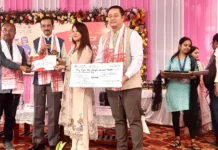ITANAGAR, 19 Jan: Some worrying trends in the physical and mental health of police personnel were revealed during a health camp organised for police personnel and their families by the Capital police here from 16 to 18 January.
During the camp, 35 percent of the participants were found to have elevated blood pressure, well above the state average of 29 percent (NFHS-5), while 14 percent showed blood sugar abnormalities, exceeding the state’s average of 10.15 percent.
Thirty-two percent of the participants had unhealthy BMI levels, indicating susceptibility to conditions like obesity, hypertension, and diabetes.
Further, a significant number of personnel exhibited anxiety-related symptoms, highlighting the psychological toll of their demanding duties. Awareness of mental health resources, such as Tele-MANAS, remains limited.
Traffic police were identified as especially vulnerable to health issues due to prolonged exposure to environmental stressors like pollution and noise.
The prevalence of infectious diseases among the participants was reported to be low, indicating effective infection management practices.
The findings from the camp emphasise the urgent need for a structured approach to address the health concerns of the police personnel, the Capital SP Rohit Rajbir Singh said.
To address the health issues, the capital police have recommended implementing structured fitness regimens across all units to promote physical wellbeing; institutionalising annual screenings for non-communicable diseases (NCD), mental health, and pulmonary functions; developing targeted health programmes for traffic police to mitigate their occupational vulnerabilities; increasing awareness and accessibility to mental health support through platforms like Tele-MANAS; and exploring the creation of an intradepartmental medical office for regular check-ups and counselling.
The camp underscored the need for a long-term collaborative approach to protect the health of those who safeguard the society, SP Singh said.
The three-day camp, conducted in collaboration with leading healthcare institutions like the TRIHMS, Heema Hospital, Niba Hospital, and Ramakrishna Mission Hospital, provided a range of medical services, including screenings for NCDs, specialised diagnostics, and psychological counselling.
The camp registered 497 participants and provided a wide array of free healthcare services, including NCD screening, viral hepatitis testing, TB screening, cervical cancer diagnostics, and specialised consultations with experts in cardiology, psychiatry, orthopaedics, and gynaecology. Psychological counselling services were also a highlight, with a focus on stress management and resilience-building.
In addition, beneficiaries were registered for ABHA IDs and CMAAY cards, ensuring their long-term access to healthcare services.

